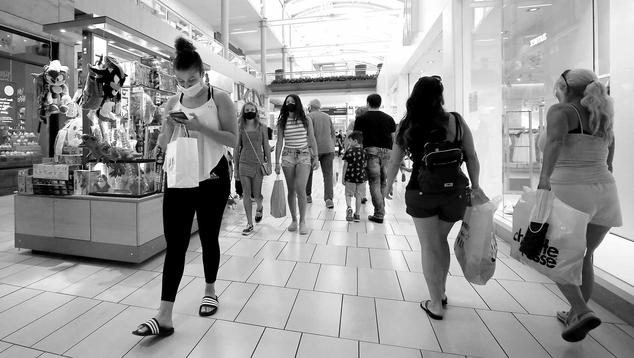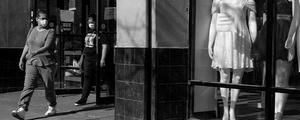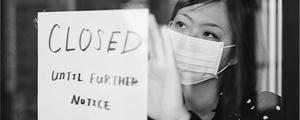Story Highlights
- 19%, down from 36% in mid-May, believe U.S. in economic depression
- Majority still believes U.S. is in either a recession or depression
- Fewer are worried about their finances being harmed by coronavirus situation
Editor's note: This story has been revised to include updated figures for June 15-21 for the percentage who say the U.S. is in a depression, revised figures for party groups and a revised Survey Methods section.
WASHINGTON, D.C. -- Americans still believe the U.S. economy is contracting, but they are less bleak in their assessments than earlier in the coronavirus pandemic. Currently, 59% of U.S. adults say the economy is in a recession or a depression. When ratings were at their worst in mid-May, 75% said so. At that time, twice as many believed the U.S. was in a depression as do so now, 36% to 19%.

Line graph. Fifty-nine percent of Americans, down from 75% in mid-May, say the U.S. economy is in a recession or a depression. The percentage who believe the economy is in a depression has dropped from 36% to 19%.
The latest results are based on June 15-21 polling in Gallup's online COVID-19 tracking survey, which interviews weekly random samples from the probability-based Gallup Panel.
Twenty-one percent of Americans now, up from 3% in mid-May, say the economy is growing, while the remaining 20% believe the economy is slowing down.
Economic assessments are shaped by party affiliation: Close to half of Republicans (45%) say the economy is growing, while more than eight in 10 Democrats say it is in a recession or depression.
However, since May, Democrats, Republicans and independents alike have become much less inclined to say the economy is in a depression, with all party groups showing declines of between 13 and 17 percentage points.
| Growing | Slowing down | Recession | Depression | |||||||||||||||||||||||||||||||||||||||||||||||||||||||||||||||||||||||||||||||||||||||||||||||||
|---|---|---|---|---|---|---|---|---|---|---|---|---|---|---|---|---|---|---|---|---|---|---|---|---|---|---|---|---|---|---|---|---|---|---|---|---|---|---|---|---|---|---|---|---|---|---|---|---|---|---|---|---|---|---|---|---|---|---|---|---|---|---|---|---|---|---|---|---|---|---|---|---|---|---|---|---|---|---|---|---|---|---|---|---|---|---|---|---|---|---|---|---|---|---|---|---|---|---|---|---|
| % | % | % | % | |||||||||||||||||||||||||||||||||||||||||||||||||||||||||||||||||||||||||||||||||||||||||||||||||
| Republicans | ||||||||||||||||||||||||||||||||||||||||||||||||||||||||||||||||||||||||||||||||||||||||||||||||||||
| Jun 15-21, 2020 | 45 | 27 | 20 | 8 | ||||||||||||||||||||||||||||||||||||||||||||||||||||||||||||||||||||||||||||||||||||||||||||||||
| May 11-17, 2020 | 7 | 38 | 31 | 24 | ||||||||||||||||||||||||||||||||||||||||||||||||||||||||||||||||||||||||||||||||||||||||||||||||
| Independents | ||||||||||||||||||||||||||||||||||||||||||||||||||||||||||||||||||||||||||||||||||||||||||||||||||||
| Jun 15-21, 2020 | 18 | 18 | 44 | 20 | ||||||||||||||||||||||||||||||||||||||||||||||||||||||||||||||||||||||||||||||||||||||||||||||||
| May 11-17, 2020 | 3 | 22 | 41 | 33 | ||||||||||||||||||||||||||||||||||||||||||||||||||||||||||||||||||||||||||||||||||||||||||||||||
| Democrats | ||||||||||||||||||||||||||||||||||||||||||||||||||||||||||||||||||||||||||||||||||||||||||||||||||||
| Jun 15-21, 2020 | 2 | 15 | 55 | 28 | ||||||||||||||||||||||||||||||||||||||||||||||||||||||||||||||||||||||||||||||||||||||||||||||||
| May 11-17, 2020 | 1 | 11 | 43 | 45 | ||||||||||||||||||||||||||||||||||||||||||||||||||||||||||||||||||||||||||||||||||||||||||||||||
| Gallup Panel | ||||||||||||||||||||||||||||||||||||||||||||||||||||||||||||||||||||||||||||||||||||||||||||||||||||
These changes could be related to the reopening of the economy, the return of many Americans to work (as evidenced by the declining unemployment rate), and continued growth in the stock market. Still, the unemployment rate remains high and the National Bureau of Economic Research recently announced the U.S. was officially in a recession, marking February as the month it started.
Fewer Worried Coronavirus Will Cause Financial Hardship for Them
This month has also seen a modest decline in the percentage of U.S. adults who say they are worried about experiencing financial hardship because of the disruption caused by the coronavirus. So far in June, an average of 44%, down from 50% the prior two months, are very or somewhat worried about experiencing such hardship.

Line graph. Forty-four percent of Americans, down from 50% in May and April, are very or somewhat worried that the coronavirus pandemic will cause them severe financial hardship.
These trends are consistent with Gallup data in a separate late May/early June telephone survey, which found significantly more Americans than in April saying their personal financial situation was getting better.
The decline in worry about experiencing severe financial hardship has occurred among all income groups, but more so among upper-income Americans. In June, an average of 38% of adults in households with annual incomes of $90,000 or more have been worried about experiencing severe financial hardship, compared with 47% in May. The decline among lower- and middle-income Americans has been about half as large.
| April | May | June | Change, May-June |
||||||||||||||||||||||||||||||||||||||||||||||||||||||||||||||||||||||||||||||||||||||||||||||||
|---|---|---|---|---|---|---|---|---|---|---|---|---|---|---|---|---|---|---|---|---|---|---|---|---|---|---|---|---|---|---|---|---|---|---|---|---|---|---|---|---|---|---|---|---|---|---|---|---|---|---|---|---|---|---|---|---|---|---|---|---|---|---|---|---|---|---|---|---|---|---|---|---|---|---|---|---|---|---|---|---|---|---|---|---|---|---|---|---|---|---|---|---|---|---|---|---|---|---|---|
| % | % | % | pct. pts. | ||||||||||||||||||||||||||||||||||||||||||||||||||||||||||||||||||||||||||||||||||||||||||||||||
| $90,000 or more annual household income | 46 | 47 | 38 | -9 | |||||||||||||||||||||||||||||||||||||||||||||||||||||||||||||||||||||||||||||||||||||||||||||||
| $36,000-$89,999 annual household income | 50 | 49 | 45 | -4 | |||||||||||||||||||||||||||||||||||||||||||||||||||||||||||||||||||||||||||||||||||||||||||||||
| Less than $36,000 annual household income | 63 | 63 | 58 | -5 | |||||||||||||||||||||||||||||||||||||||||||||||||||||||||||||||||||||||||||||||||||||||||||||||
| Gallup Panel | |||||||||||||||||||||||||||||||||||||||||||||||||||||||||||||||||||||||||||||||||||||||||||||||||||
As concerns about financial hardship have lessened, there has been an increase in the percentage of Americans who say they can follow social distancing procedures and endure business closures "as long as necessary" before experiencing financial hardship. Sixty-three percent now say this, up from 58% last month.
About one in five Americans say they could survive just a few more weeks before experiencing hardship (10%) or are already experiencing it (12%). Fifteen percent say they could go a few more months before their financial situation suffers.

Line graph. Sixty-three percent of U.S. adults say they can endure social distancing and business closures as long as necessary before they experience significant financial hardship. This is up from 58% in May.
Implications
The May jobs report and the continued increase in stock values could be convincing many Americans that the worst of the economic damage brought on by the coronavirus is over. Early on in the crisis, Gallup found Americans were pessimistic about the longer-term effect on their finances, but the percentage who rated their current financial situation positively was down only slightly.
Still, a number of states are showing increasing COVID-19 cases, a stark reminder that the coronavirus crisis is still very much alive, and the health of the economy and Americans' finances will be tied to the future course of the virus in the U.S.
Learn more about how the Gallup Panel works.




